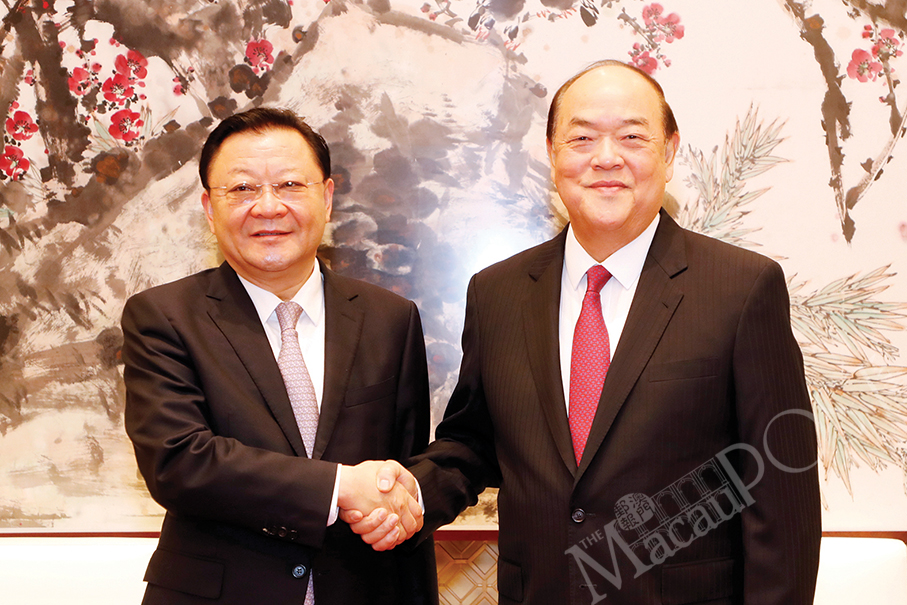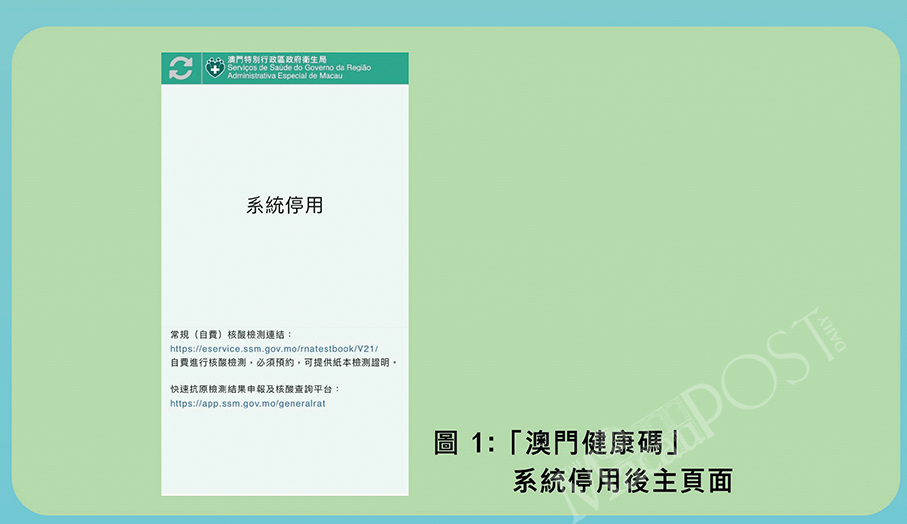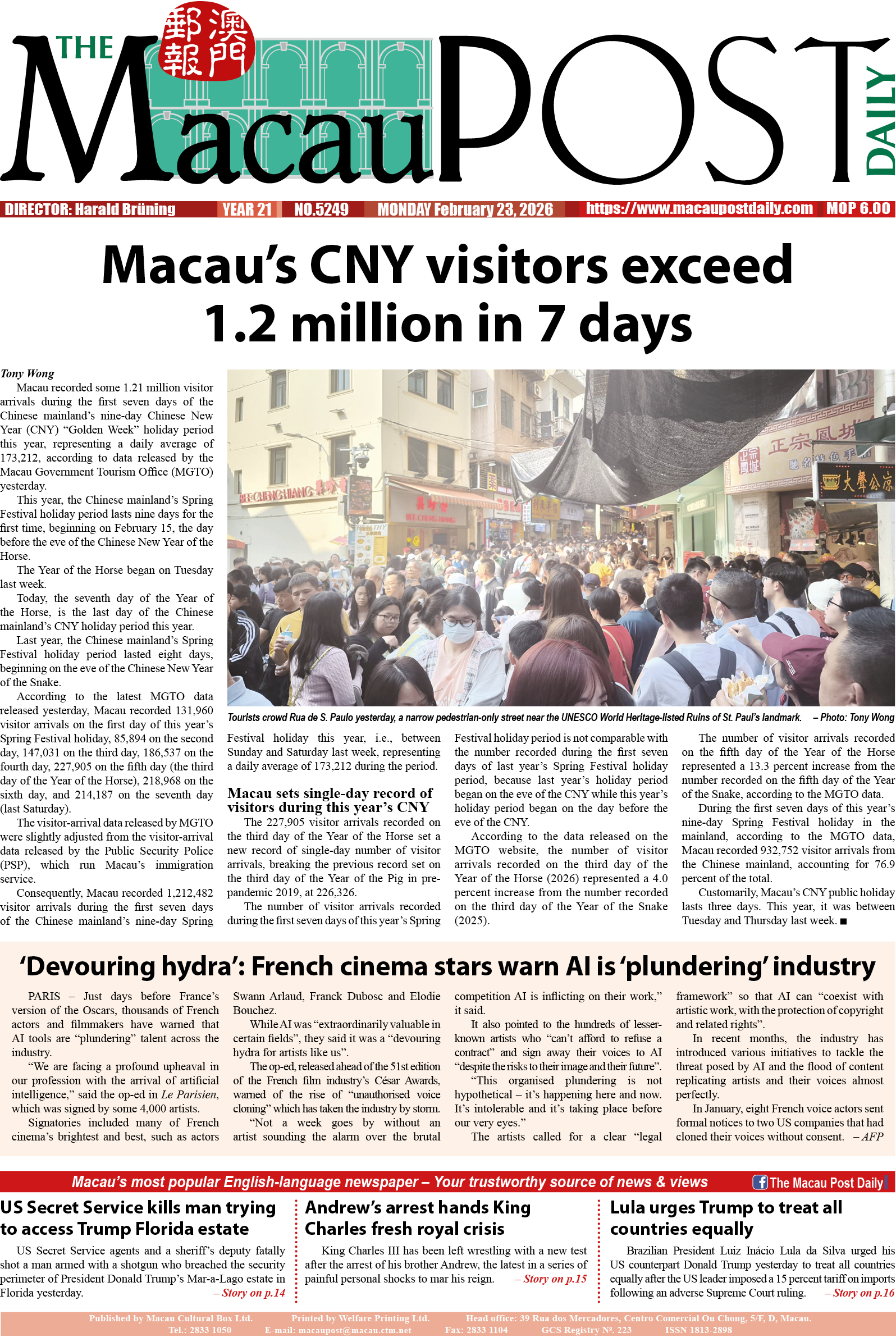Macau to ban import of live & fresh food products from Tokyo & 9 Japanese prefectures from tomorrow: GCS
The Macau government announced yesterday that starting from tomorrow it will ban the import of live and fresh food products from nine Japanese prefectures and Tokyo Metropolis after the Japanese government announced the discharge of contaminated water into the sea from the Fukushima nuclear plant from as early as tomorrow, according to a statement by the Macau Government Information Bureau (GCS) yesterday.
Earlier this year, Japan announced its plan to gradually discharge more than a million tonnes of treated water from the crippled Fukushima nuclear plant into the sea.
The local government said the ban aimed to safeguard the food sold in Macau and public health.
According to the statement, the government will ban the import of live and fresh food products, food products of animal origin, sea salt and seaweed, including vegetables, fruit, milk and milk products, aquatic products and their derivatives, meat and meat products and poultry eggs, from 10 regions in Japan, namely Fukushima Prefecture, Chiba Prefecture, Tochigi Prefecture, Ibaraki Prefecture, Gunma Prefecture, Miyagi Prefecture, Niigata Prefecture, Nagano Prefecture and Saitama Prefecture as well as Tokyo Metropolis.
The ban will take effect tomorrow.
Hong Kong’s Centre for Food Safety (CFS) yesterday imposed the same ban, which also will become effective tomorrow, according to a CFS statement.
According to local media reports earlier this year, Macau’s imports of Japanese aquatic products mainly come from Ehime, Fukuoka, Hokkaido, Kagoshima and Nagasaki prefectures.
‘Extremely irresponsible’
According to the GCS statement, the local government yesterday expressed “strong dissatisfaction” with Japan’s decision to discharge contaminated wastewater into the sea, condemning it as being “extremely irresponsible” without ample consultation with its neighbouring countries.
According to the GCS statement yesterday, the Municipal Affairs Bureau (IAM) will reinforce inspections of retail stores in the city, including conducting tests with handheld radiation measuring instruments on non-staple food products, such as pre-packaged food products like rice, seaweed, tea leaves, and snacks.
According to Wikipedia, the Fukushima Daiichi nuclear plant suffered major damage from a magnitude 9.0 earthquake and tsunami that hit Japan on March 11, 2011, with about 1.34 million tonnes of contaminated water having been stored at the Fukushima Daiichi plant in more than 1,000 giant storage tanks since the accident. The plant is still producing 100 cubic metres of contaminated water every day.
Japan’s version
Japan Tokyo Electric Power company Holdings (TEPCO) said yesterday that it has started to transfer “treated water” into storage tanks for initial discharge through an undersea tunnel.
According to Japan Tokyo Electric Power Company Holdings (TEPCO), a total of 31,200 cubic metres of contaminated water will be discharged from as early as tomorrow to March 31, 2024, equivalent to 2.3 percent of the current contaminated water storage volume.
According to TEPCO, the company plans to discharge a total of 400,000 cubic metres of contaminated wastewater over the next decade, and will “start little by little” in four phases in the first year to ensure safe discharge, adding that the quality of the discharged water has been confirmed to meet the requirements of the Japanese central government and the prefectural governments.
TEPCO also said it will publish and update the results of nuclide concentration detection in the discharged water and sea, monitoring the results on its official website every day, and that if there is an anomaly during discharge, such as if the sea water pump used to dilute the sewage stops working, or the sea area test value exceeds the official standards, two emergency brake valves will be activated, while in case of tsunami or an earthquake, the discharge will stop.
Beijing urges Japan to axe plan
Foreign Ministry spokesman Wang Wenbin said at a regular press briefing in Beijing yesterday that China has always put the people first, and relevant departments will take necessary measures to safeguard food safety and the health of the Chinese people.
Wang also strongly urged the Japan government to “correct its wrong decision”, i.e., withdraw its plan to release the contaminated water into the sea, and to communicate with its neighbours about disposing of the contaminated water in a responsible manner, as well as accept strict supervision by the international community.
HK CE slams Japan’s ‘unprecedented’ discharge
Meanwhile, Hong Kong Chief Executive John Lee Ka-chiu said in a statement yesterday that food safety and public health in Hong Kong are the top priority of his government, pointing out that he has immediately ordered the Hong Kong Environment and Ecology Bureau (EEB) and relevant departments to initiate import control measures to safeguard food safety and public health in Hong Kong.
Lee described the Japanese government’s decision to discharge nuclear wastewater into the sea as being “unprecedented”, as the 30 years of large-scale discharge of nuclear wastewater would make it difficult for the marine environment to recover from the pollution and damage, adding that it was irresponsible to impose one’s own problems on others.

This handout photo provided by the Municipal Affairs Bureau (IAM) yesterday shows an IAM official inspecting a fish imported from Japan.








